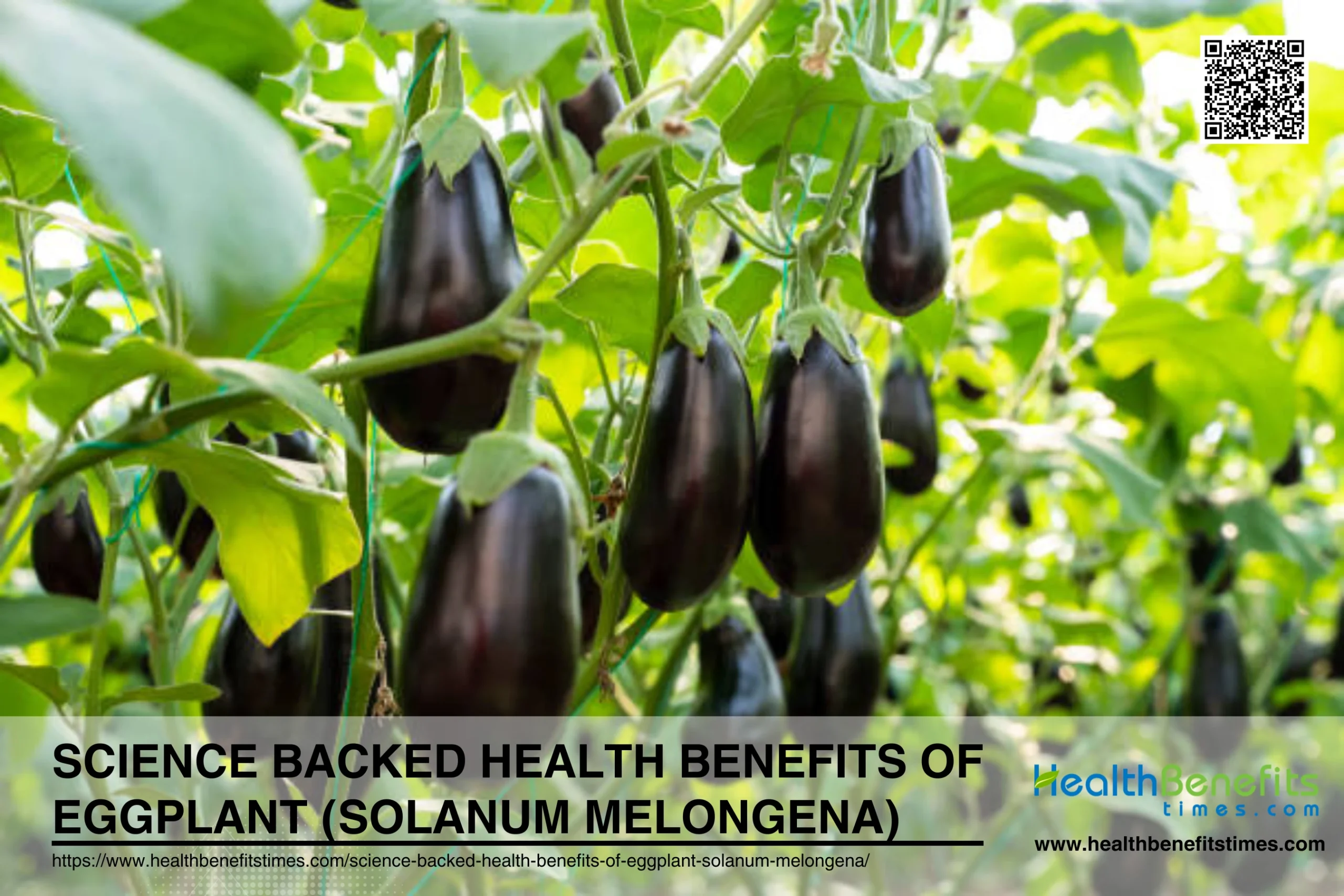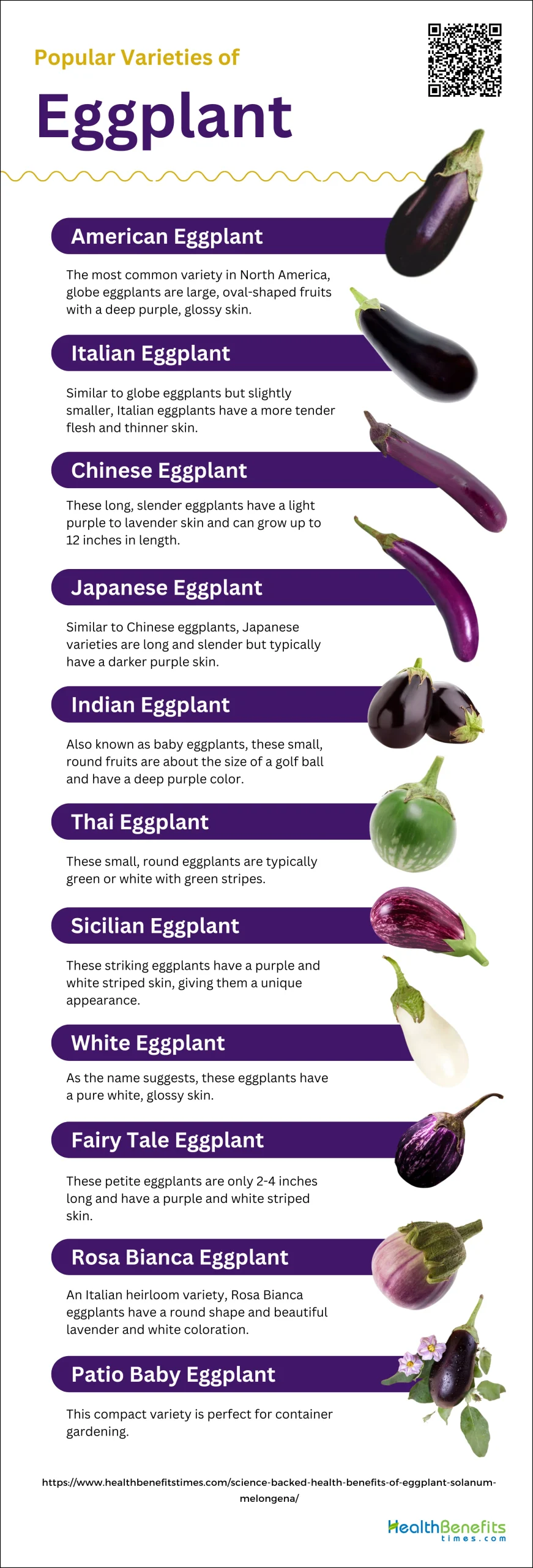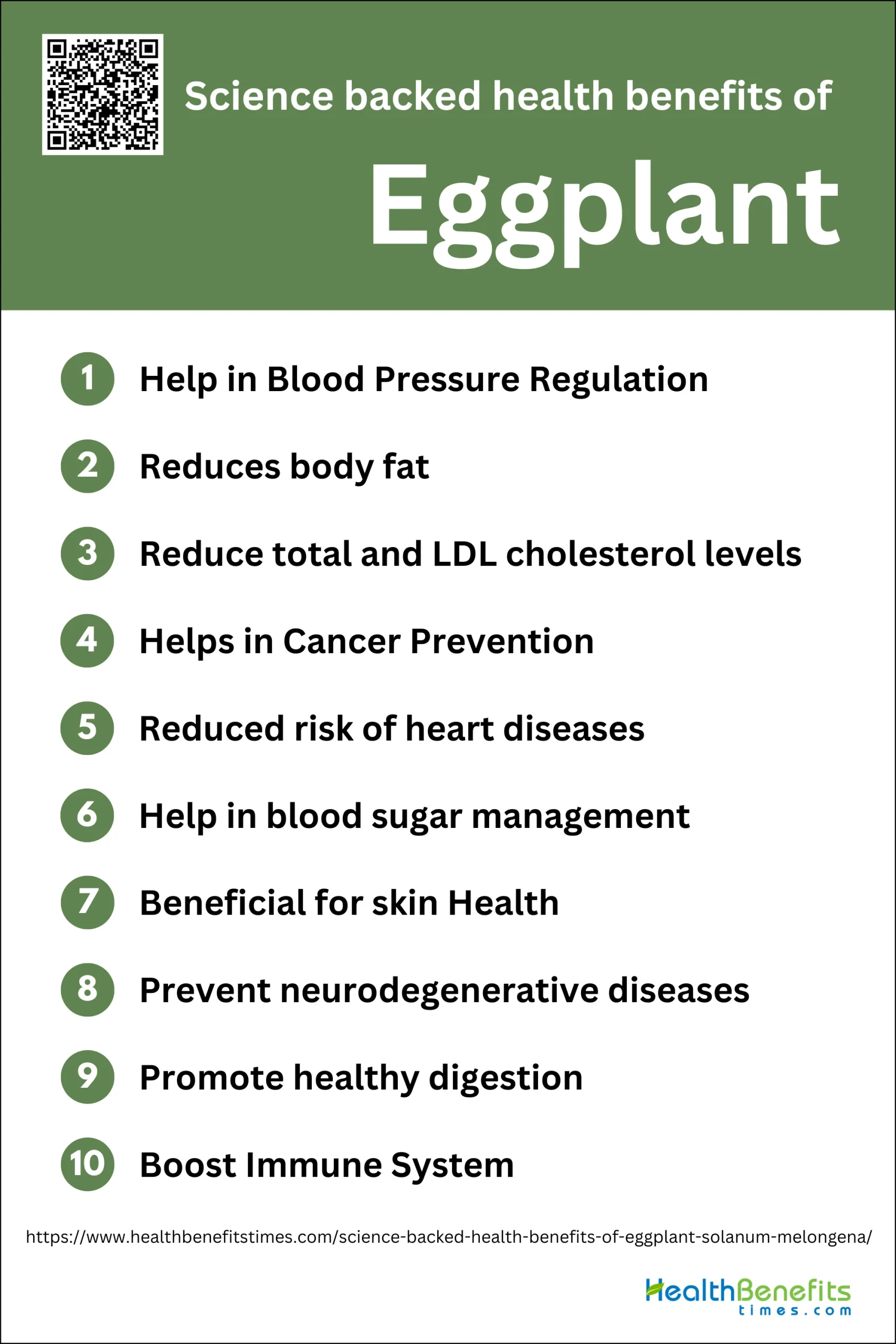- Eggplant is cultivated, nutrient-rich vegetable with health benefits, antioxidants, dietary fiber.
- Different eggplant varieties are Globe, Italian, Chinese, Japanese, Indian, Thai, Graffiti, White, Fairy Tale, Rosa Bianca, Patio Baby.
- Eggplant is versatile, nutrient-rich, promotes heart health, weight loss, reduces cholesterol.
- Eggplant has antioxidants and bioactive compounds aid cancer prevention, reduce inflammation.
- Eggplant is rich in antioxidants, vitamins, hydrates skin, reduces aging signs.
- Eggplant is versatile, nutritious, great for grilling, baking, roasting, worldwide dishes.
- Eggplant side effects includes digestive discomfort, solanine poisoning, allergies, iron absorption, oxalates, inflammation.
 Eggplant (Solanum melongena), also known as aubergine or brinjal, is a versatile and nutrient-rich vegetable that has been cultivated for centuries. This member of the nightshade family boasts an impressive array of science-backed health benefits, owing to its unique nutritional profile and bioactive compounds. Rich in fiber, vitamins, minerals, and antioxidants, eggplant has garnered attention from researchers and health enthusiasts alike for its potential to promote heart health, regulate blood sugar levels, and even contribute to cancer prevention. This article delves into the scientific evidence supporting the various health benefits of eggplant, exploring its nutritional content and the mechanisms by which it may positively impact human health.
Eggplant (Solanum melongena), also known as aubergine or brinjal, is a versatile and nutrient-rich vegetable that has been cultivated for centuries. This member of the nightshade family boasts an impressive array of science-backed health benefits, owing to its unique nutritional profile and bioactive compounds. Rich in fiber, vitamins, minerals, and antioxidants, eggplant has garnered attention from researchers and health enthusiasts alike for its potential to promote heart health, regulate blood sugar levels, and even contribute to cancer prevention. This article delves into the scientific evidence supporting the various health benefits of eggplant, exploring its nutritional content and the mechanisms by which it may positively impact human health.
What is Eggplant (Solanum melongena)?
Eggplant (Solanum melongena L.) is a widely cultivated and consumed vegetable known for its edible fruit, which is rich in health-promoting compounds such as anthocyanins and phenylpropanoid amides. Originating from the Old World, particularly Asia and Africa, eggplant belongs to the Solanaceae family and is closely related to other important crops like tomato and potato. It has been used in traditional medicine and culinary practices across various cultures, and recent studies have highlighted its potential for genetic improvement through breeding and biotechnological approaches. Despite its popularity, eggplant faces challenges such as susceptibility to pests and diseases, which has spurred research into developing resistant varieties through genetic engineering and hybridization with wild relatives. The availability of genomic resources and the understanding of its evolutionary history further enhance its potential as a model plant for studying various aspects of plant biology and improving crop resilience.
Nutritional Profile of Eggplant
Eggplant is a low-calorie vegetable that packs a nutritional punch. A 1-cup (82g) serving of raw eggplant contains only 20 calories, 0.98g of protein, 4.82g of carbohydrates, and 0.18g of fat. It’s an excellent source of dietary fiber, providing 3g per cup, which is about 10% of the daily recommended intake. Eggplant also contains small amounts of essential vitamins and minerals, making it a valuable addition to a balanced diet.
Vitamins and minerals
Eggplant is a good source of several vitamins and minerals. It contains manganese, folate, potassium, vitamin K, and vitamin C. While the amounts of these nutrients are not exceptionally high, they contribute to the overall nutritional value of eggplant. For example, a cup of raw eggplant provides 10% of the recommended daily intake (RDI) of manganese, 5% of the RDI for folate, and 5% of the RDI for potassium.
Vitamin C
Eggplant contains a modest amount of vitamin C, with about 1.8-2.2mg per 100g of raw eggplant. While this is not as high as some other fruits and vegetables, it still contributes to your daily vitamin C intake. Vitamin C is an important antioxidant that supports immune function and skin health. Cooking eggplant may reduce its vitamin C content, as heat can degrade this water-soluble vitamin.
Vitamin K
Eggplant is a source of vitamin K, providing about 2.9-3.5mg per 100g of raw eggplant. Vitamin K plays a crucial role in blood clotting and bone health. A cup of cooked eggplant (about 96g) contains approximately 2.87mcg of vitamin K, which is about 2% of the daily recommended intake for adults. Including eggplant in your diet can help contribute to your overall vitamin K intake.
Vitamin B6
Eggplant contains small amounts of vitamin B6, with about 0.084-0.1mg per 100g of raw eggplant. Vitamin B6 is essential for brain development and function, and it helps the body produce serotonin and norepinephrine, which affect mood. While eggplant is not a major source of vitamin B6, it can contribute to your daily intake when consumed as part of a varied diet.
Folate
Eggplant is a good source of folate, providing about 18-22mg per 100g of raw eggplant. Folate is crucial for DNA synthesis and cell division, making it particularly important for pregnant women and developing fetuses. A cup of cooked eggplant (about 96g) contains approximately 13.86mcg of folate, which is about 3% of the daily recommended intake for adults.
Potassium
Eggplant is a good source of potassium, with about 229mg per cup of raw eggplant. Potassium is an essential mineral that helps regulate fluid balance, nerve signals, and muscle contractions. It’s also important for heart health and may help lower blood pressure. A cup of cooked eggplant (about 96g) provides approximately 121.77mg of potassium, which is about 3% of the daily recommended intake for adults.
Antioxidants
Eggplant is rich in various antioxidants, which help protect the body against damage from harmful free radicals. The purple skin of eggplant is particularly high in anthocyanins, a type of flavonoid with potent antioxidant properties. These antioxidants may help reduce the risk of chronic diseases such as heart disease and certain types of cancer. The antioxidant content of eggplant contributes significantly to its potential health benefits.
Anthocyanins
Anthocyanins are the pigments responsible for the deep purple color of eggplant skin. These compounds are powerful antioxidants that have been linked to various health benefits, including improved heart health and reduced inflammation. The anthocyanin content in eggplant varies depending on the variety and growing conditions, but it’s generally higher in darker-colored eggplants. Consuming eggplant with its skin intact ensures you get the maximum anthocyanin content.
Nasunin
Nasunin is a specific type of anthocyanin found in the skin of eggplants, particularly in purple varieties. This antioxidant has been shown to have several potential health benefits. Studies suggest that nasunin may help protect brain cell membranes from damage caused by free radicals. It may also have anti-inflammatory properties and could potentially help in managing blood sugar levels, although more research is needed to confirm these effects in humans.
Fiber content
Eggplant is an excellent source of dietary fiber, providing about 3g per cup of raw eggplant. This amounts to approximately 10% of the daily recommended intake for adults. The fiber in eggplant is primarily insoluble fiber, which adds bulk to the stool and helps promote regular bowel movements. Additionally, the high fiber content of eggplant can help you feel fuller for longer, potentially aiding in weight management efforts. Fiber also plays a role in maintaining gut health and may help lower cholesterol levels.
Popular Varieties of Eggplant
Here is a list of different varieties of eggplant (Solanum melongena), with a short paragraph on each:
Globe or American Eggplant
The most common variety in North America, globe eggplants are large, oval-shaped fruits with a deep purple, glossy skin. They typically measure 6-9 inches long and have a meaty texture with a slightly bitter taste. These versatile eggplants are ideal for grilling, roasting, or using in dishes like eggplant parmesan.
Italian Eggplant
Similar to globe eggplants but slightly smaller, Italian eggplants have a more tender flesh and thinner skin. They are typically 5-8 inches long with a teardrop shape and deep purple color. Italian eggplants are excellent for dishes like eggplant parmesan, caponata, or grilling.
Chinese Eggplant
These long, slender eggplants have a light purple to lavender skin and can grow up to 12 inches in length. Chinese eggplants have a sweeter, milder flavor and fewer seeds compared to globe varieties. They are perfect for stir-frying, grilling whole, or using in Asian-inspired dishes.
Japanese Eggplant
Similar to Chinese eggplants, Japanese varieties are long and slender but typically have a darker purple skin. They have a delicate flavor, creamy texture, and thin skin that doesn’t require peeling. Japanese eggplants are excellent for grilling, roasting, or using in stir-fries.
Indian Eggplant
Also known as baby eggplants, these small, round fruits are about the size of a golf ball and have a deep purple color. They have a tender texture and mild flavor, making them perfect for stuffing, roasting whole, or using in curries.
Thai Eggplant
These small, round eggplants are typically green or white with green stripes. They have a crunchy texture and slightly bitter taste when raw, but become tender and mild when cooked. Thai eggplants are often used in curries or eaten raw in salads.
Graffiti or Sicilian Eggplant
These striking eggplants have a purple and white striped skin, giving them a unique appearance. They are typically smaller than globe eggplants and have a tender, sweet flesh with few seeds. Graffiti eggplants are excellent for grilling, roasting, or using in salads.
White Eggplant
As the name suggests, these eggplants have a pure white, glossy skin. They are similar in shape and size to globe eggplants but have a milder, creamier flavor and denser flesh. White eggplants are versatile and can be used in various cooking methods.
Fairy Tale Eggplant
These petite eggplants are only 2-4 inches long and have a purple and white striped skin. They have a tender texture, sweet flavor, and thin skin that doesn’t require peeling. Fairy tale eggplants are perfect for grilling, sautéing, or roasting whole.
Rosa Bianca Eggplant
An Italian heirloom variety, Rosa Bianca eggplants have a round shape and beautiful lavender and white coloration. They have a mild, non-bitter flavor and creamy texture, making them ideal for roasting, grilling, or using in eggplant parmesan.
Patio Baby Eggplant
This compact variety is perfect for container gardening. The plants produce small, egg-shaped fruits that are dark purple in color. Patio Baby eggplants have a tender texture and mild flavor, making them suitable for grilling, stuffing, or roasting.
Science backed health benefits of Eggplant
Eggplant is more than just a versatile ingredient in global cuisines; it is a powerhouse of health benefits backed by science. This glossy, purple vegetable belongs to the nightshade family and is packed with essential nutrients, antioxidants, and bioactive compounds that contribute to overall well-being. From promoting heart health and aiding in weight loss to potentially reducing cancer risk and enhancing brain function, eggplant offers a myriad of advantages. In this article, we delve into the top science-backed health benefits of eggplant (Solanum melongena) that make it a valuable addition to your diet.
1. Help in Blood Pressure Regulation
Eggplant has been shown to help regulate blood pressure due to its rich content of acetylcholine (ACh), a neurotransmitter that influences cardiovascular function. Daily intake of eggplant powder significantly reduces both systolic and diastolic blood pressure in individuals with normal-high blood pressure and grade 1 hypertension. The antihypertensive effect is attributed to the inhibition of the angiotensin-converting enzyme (ACE), similar to the mechanism of common blood pressure medications such as lisinopril. Additionally, the high potassium content in eggplant further aids in maintaining healthy blood pressure levels by balancing sodium in the body and promoting vascular relaxation.
What Research Says?
- Eggplant powder significantly lowers both acute and chronic blood pressure levels in spontaneously hypertensive rats. This effect is attributed to the acetylcholine content in eggplant, which acts on the M3 muscarinic ACh receptor to suppress sympathetic nervous activity.
- Eating eggplant powder every day can lower blood pressure in stressed people who have slightly high or grade 1 high blood pressure. This benefit shows up after 8 and 12 weeks, and it also helps improve mood. The substance in eggplant that does this is called acetylcholine.
2. Reduces body fat

This effect is likely due to eggplant’s high fiber content and low calorie density, which can promote feelings of fullness and reduce overall calorie intake. Additionally, eggplant contains compounds that may help inhibit pancreatic lipase activity, potentially reducing fat absorption. The vegetable’s ability to aid in weight management is further supported by its role in high-fiber diets, which have been associated with better weight control and prevention of obesity.
What Research Says?
- A study on overweight women showed that a hypoenergetic diet combined with eggplant flour significantly reduced body fat and waist circumference.
- In male New Zealand rabbits, a diet supplemented with eggplant fruits led to weight reduction and improved lipid profiles.
- Eggplant peel extract significantly decreased total cholesterol, triglycerides, LDL, and VLDL levels in hyperlipidemic rats, while increasing HDL levels.
- In LDL receptor knockout mice, eggplant extract did not decrease plasma cholesterol or prevent atherosclerosis, and it increased oxidative stress.
- In hypercholesterolemic human subjects, eggplant infusion had a modest and transitory effect on reducing total and LDL cholesterol, but these effects were not significant when combined with dietary orientation.
3. Reduce total and LDL cholesterol levels
Eggplant can play a significant role in reducing total and LDL cholesterol levels, thanks to its high content of dietary fiber and antioxidants. The fiber in eggplant binds to bile acids in the digestive system, which are made from cholesterol. To replace these bile acids, the body uses up more cholesterol from the bloodstream, thereby lowering overall cholesterol levels. Additionally, eggplant contains chlorogenic acid, a powerful antioxidant that has been shown to reduce LDL cholesterol, often referred to as “bad” cholesterol. Eggplant juice can significantly lower both total and LDL cholesterol levels, suggesting that regular consumption of eggplant can contribute to better heart health by reducing the risk of atherosclerosis and other cardiovascular diseases.
What Research Says?
- Some studies suggest that eggplant infusion can modestly and temporarily reduce total and LDL cholesterol levels in hypercholesterolemic subjects, but these effects are not significantly different from standard dietary and physical activity interventions.
- Multiple studies have found that eggplant extract does not significantly alter serum lipid levels, including total cholesterol and LDL cholesterol, when compared to control groups or standard treatments like statins.
- In animal studies, eggplant has shown some potential in reducing cholesterol absorption, possibly through the binding of bile salts, although it did not significantly lower serum cholesterol levels.
4. Helps in Cancer Prevention
Eggplant shows promising potential in cancer prevention, thanks to its rich content of antioxidants and bioactive compounds. The dark purple skin of eggplant contains nasunin, an anthocyanin with potent antioxidant properties that help protect cell membranes from damage caused by free radicals, which are unstable molecules that can lead to cancer. Additionally, eggplant is high in chlorogenic acid, another powerful antioxidant that has been shown to inhibit the growth of cancer cells and reduce inflammation. Bioactive glycoalkaloids in eggplant, such as solamargine, exhibit cytotoxic effects against various cancer cell lines, including liver and breast cancer cells. Regular consumption of eggplant, therefore, may contribute to a reduced risk of cancer by neutralizing harmful free radicals and inhibiting tumor growth.
What Research Says?
- Eggplant contains amides and phenylpropanoids, such as n-trans-p-coumaroyltyramine, n-trans-p-coumaroyloctopamine, n-trans-p-coumaroylnoradrenline, n-trans-feruloyloctopamine, and neochlorogenic acid, which have shown cytotoxic activities against cancer cell lines A549, HCT116, and MCF7.
- The phytochemical analysis of eggplant reveals it is rich in compounds like aspartic acid, tropane, flavonoids, lanosterol, gramisterol, steroid alkaloids, glycoalkaloids, histidine, nasunin, oxalic acid, solasodine, ascorbic acid, and tryptophan, which contribute to its anti-cancer properties.
5. Reduced risk of heart diseases

Regular consumption of eggplant can contribute to cardiovascular health. The high fiber content in eggplants helps lower cholesterol levels by binding to bile acids in the digestive system, which prompts the body to use more cholesterol to replace these bile acids. Additionally, eggplants are rich in antioxidants, particularly nasunin and chlorogenic acid, which protect against oxidative stress and inflammation – key factors in heart disease development. A study on rabbits with high cholesterol showed that eggplant juice consumption led to reduced levels of both LDL cholesterol and triglycerides. Furthermore, the potassium content in eggplants aids in regulating blood pressure, while its low calorie and fat content make it an excellent addition to a heart-healthy diet.
What Research Says?
- Eggplant did not reduce total cholesterol or atherogenic lipoproteins in LDL receptor knockout mice, and it did not prevent the development of atherosclerosis. Instead, it increased oxidative stress, which is a risk factor for atherosclerosis.
- Eggplant has shown potential benefits in managing metabolic syndrome (MetS) and its complications, such as diabetes, high blood pressure, hyperlipidemia, and obesity. It possesses anti-oxidant, antidiabetic, antihypertensive, and antihyperlipidemic properties.
6. Help in blood sugar management
Eggplant is highly beneficial for blood sugar management, making it an excellent choice for individuals with diabetes. This vegetable has a remarkably low glycemic index (GI) of around 15-20, which means it has a minimal impact on blood glucose levels. The high fiber content in eggplant slows down the digestion and absorption of carbohydrates, preventing spikes in blood sugar after meals. Additionally, eggplant contains bioactive compounds such as phenols and flavonoids that have been shown to inhibit enzymes like α-amylase and α-glucosidase, which are involved in carbohydrate breakdown, thereby reducing glucose absorption.
What Research Says?
- Eggplant contains phenolic compounds that exhibit significant alpha-glucosidase inhibitory activity, which can help control glucose absorption and reduce hyperglycemia-induced pathogenesis.
- Studies on diabetic rats have shown that eggplant extract can significantly lower blood glucose levels. Different doses of eggplant extract were tested, and it was found that the extract could bring blood glucose levels close to normal.
- Ethanol extracts from purple eggplant skin were effective in reducing blood glucose levels and promoting the regeneration of pancreatic β cells in hypercholesterolemia-diabetic rats. The most effective dose was found to be 25 mg/kg body weight.
- A randomized controlled trial in humans showed that daily ingestion of eggplant powder significantly decreased blood pressure and improved psychological states in stressed individuals, suggesting additional health benefits that may indirectly support blood sugar management.
7. Beneficial for skin Health

The purple skin of eggplant contains nasunin, an anthocyanin with potent antioxidant properties that protect cell membranes from oxidative damage caused by free radicals. This protection helps to slow down the aging process, reducing the appearance of fine lines, wrinkles, and dark spots. Additionally, eggplant is a good source of vitamin C, which is essential for collagen production, promoting skin elasticity and firmness. The high water content in eggplant also helps to keep the skin hydrated and moisturized, enhancing its glow and smoothness. Furthermore, chlorogenic acid found in eggplant has been shown to have anti-inflammatory and antimicrobial properties, which can help in preventing skin infections and conditions such as acne. Regular consumption of eggplant, therefore, can contribute to healthier, more youthful-looking skin.
What Research Says?
- The ethanolic extract of eggplant has shown strong inhibitory effects on the growth of Propionibacterium acnes, a bacterium associated with acne. Higher concentrations of the extract (up to 90%) resulted in larger inhibition zones, indicating significant antibacterial activity.
- Eggplant, particularly the purple cultivar, contains high levels of anthocyanins in its skin. These compounds are known for their health-promoting properties, including potential benefits for skin health. The upregulation of anthocyanin biosynthetic genes in the purple cultivar suggests a higher concentration of these beneficial compounds.
8. Prevent neurodegenerative diseases
Eggplant exhibits significant potential in preventing neurodegenerative diseases due to its rich content of antioxidants and bioactive compounds. Eggplant extracts, particularly those rich in chlorogenic acid and nasunin, can protect against neurotoxicity by neutralizing reactive oxygen species (ROS) and reducing oxidative stress, which are major contributors to neurodegenerative conditions like Alzheimer’s and Parkinson’s diseases. For instance, research on Parkinsonian rat models demonstrated that eggplant extract could restore dopamine levels and improve neurobehavioral functions by scavenging free radicals and enhancing antioxidant enzyme activities in the brain. Additionally, the phenolic compounds in eggplant have been found to inhibit neuroinflammation and protect neuronal cells from damage, further supporting its role in neuroprotection. Regular consumption of eggplant, therefore, may contribute to the prevention and management of neurodegenerative diseases by mitigating oxidative stress and enhancing brain health.
What Research Says?
- Eggplant-supplemented diets can modulate purinergic, monoaminergic, and cholinergic enzyme systems, which are associated with Alzheimer’s disease-like symptoms in diabetic models.
- Chlorogenic acid-rich Solanum melongena extracts protect against rotenone-induced neurotoxicity in PC-12 cells by preventing apoptosis, reducing reactive oxygen species (ROS), and increasing ATP production.
- Purple eggplant extract ameliorates cognitive impairment in D-galactose-induced aging models by inhibiting oxidative stress and acetylcholinesterase activity in the hippocampus.
- Solanum vegetable-based diets, including African eggplant and black nightshade, improve memory, redox balance, and enzyme activities in a Drosophila melanogaster model of neurodegeneration.
9. Promote healthy digestion
Eggplant promotes healthy digestion through its high fiber content and beneficial compounds. A 100g serving of raw eggplant provides about 3g of dietary fiber, which is approximately 10% of the daily recommended intake. This fiber adds bulk to the stool, promotes regular bowel movements, and helps prevent constipation. Additionally, the fiber in eggplant slows down the digestion and absorption of carbohydrates, which can help regulate blood sugar levels. Eggplant also contains prebiotics, a type of fiber that feeds beneficial gut bacteria (probiotics), supporting a healthy gut microbiome. The vegetable’s high water content further aids in digestion and helps maintain proper hydration of the digestive tract. Moreover, eggplant stimulates the secretion of gastric juices, which facilitates food processing and nutrient absorption.
What Research Says?
- Eggplant contains high levels of dietary fiber, which is beneficial for digestive health by promoting regular bowel movements and preventing constipation.
- Eggplant is rich in various bioactive compounds, including vitamins, minerals, and phytochemicals, which have been linked to the prevention and management of various health conditions, including those affecting the digestive system.
- Eggplant is rich in various bioactive compounds, including vitamins, minerals, and phytochemicals, which have been linked to the prevention and management of various health conditions, including those affecting the digestive system.
- Different cooking methods affect the stability and bioaccessibility of eggplant’s phenolic compounds. Frying, baking, and grilling can influence the release and absorption of these beneficial compounds, which can impact digestive health.
10. Boost Immune System

The vegetable is particularly high in anthocyanins, such as nasunin, which have potent antioxidant properties that protect cells from damage caused by free radicals, thereby enhancing immune function. Additionally, eggplant contains vitamin C, a vital nutrient that stimulates the production and function of white blood cells, the body’s primary defense against infections. The presence of polyphenolic compounds in eggplant also contributes to its anti-inflammatory and antimicrobial properties, further supporting the immune system. Regular consumption of eggplant can, therefore, help fortify the body’s natural defenses and promote overall health.
What Research Says?
- Ethanol extracts of eggplant stalks show significant anti-inflammatory effects by reducing the production of nitric oxide, pro-inflammatory cytokines, and prostaglandin E2 in macrophage RAW 264.7 cells. This suggests that eggplant stalks could be useful in developing anti-inflammatory agents or dietary supplements.
How to Incorporate Eggplant into Your Diet:
Eggplant is a versatile and nutritious vegetable that can be easily incorporated into your diet in various ways. You can slice it and grill it as a side dish, cube it and add it to stir-fries or pasta sauces, or puree it to make dips like baba ganoush. Eggplant can also be used as a meat substitute in vegetarian dishes due to its meaty texture. Try using thin slices of eggplant instead of lasagna noodles for a low-carb alternative, or stuff whole eggplants with a mixture of grains, vegetables, and cheese for a hearty main course. Adding eggplant to your meals not only increases your vegetable intake but also introduces new flavors and textures to your culinary repertoire.
Culinary versatility: grilling, baking, roasting, etc.:
Eggplant’s culinary versatility makes it a favorite among chefs and home cooks alike. Grilling eggplant slices or halves imparts a smoky flavor and creates a tender texture, perfect for salads or as a side dish. Baking eggplant is ideal for dishes like eggplant parmesan, where slices are layered with cheese and sauce. Roasting whole eggplants or cubes brings out their natural sweetness and creates a creamy consistency, ideal for dips or spreads. Eggplant can also be sautéed, stir-fried, or even deep-fried for crispy eggplant fries or fritters. Its ability to absorb flavors makes it an excellent addition to curries, stews, and casseroles. This adaptability allows eggplant to shine in a wide range of cuisines and cooking methods.
Popular dishes from around the world (e.g., baba ganoush, ratatouille):
Eggplant features prominently in many beloved dishes from various cuisines around the world. In the Middle East, baba ganoush, a smoky eggplant dip, is a popular appetizer. French cuisine offers ratatouille, a vegetable stew where eggplant plays a starring role alongside zucchini, tomatoes, and peppers. Italian eggplant parmesan and Greek moussaka are hearty, layered dishes that showcase eggplant’s ability to absorb flavors. In Asian cuisines, you’ll find dishes like Chinese yu xiang eggplant, Japanese nasu dengaku (miso-glazed eggplant), and Indian baingan bharta (mashed eggplant curry). Turkish cuisine features imam bayildi, stuffed eggplant simmered in olive oil. These diverse dishes demonstrate eggplant’s global appeal and its ability to adapt to different flavor profiles and cooking techniques.

Tips for selecting and storing eggplants:
When selecting eggplants, look for firm, smooth-skinned fruits that feel heavy for their size. The skin should be glossy and free from blemishes or soft spots. Smaller eggplants tend to be sweeter and less seedy than larger ones. To test for ripeness, gently press the skin with your thumb; if it springs back, the eggplant is ripe. For storage, keep eggplants at room temperature if you plan to use them within a day or two. For longer storage, place them in the crisper drawer of your refrigerator, where they can last up to a week. Avoid washing eggplants before storage, as excess moisture can lead to spoilage. When ready to use, cut eggplants just before cooking to prevent browning. If you need to store cut eggplant, brush the exposed flesh with lemon juice to prevent discoloration, wrap it tightly in plastic wrap, and refrigerate for up to 3-4 days.
Side effects of eating too much eggplant
Based on the search results provided, here are individual paragraphs on the potential side effects of eating too much eggplant:
Digestive Issues:
Consuming excessive amounts of eggplant may lead to digestive discomfort, particularly in individuals with sensitive digestive systems. The high fiber content in eggplant can cause gas, bloating, and stomach upset if eaten in large quantities. People with weak digestive systems should be cautious and moderate their intake of eggplant to avoid these issues.
Solanine Poisoning:
Eggplants contain solanine, a natural toxin found in nightshade vegetables. While the levels in eggplant are generally low, excessive consumption may lead to solanine poisoning. Symptoms can include nausea, vomiting, and drowsiness. However, it’s important to note that you would need to eat an extremely large amount of eggplant (around 1000 eggplants in a single sitting for a 150-lb person) to experience severe effects.
Allergic Reactions:
Some individuals may experience allergic reactions to eggplant, especially those sensitive to nightshade vegetables. Symptoms can range from mild to severe and may include difficulty breathing, swelling, hives, and in rare cases, anaphylaxis. If you experience any allergic reactions after consuming eggplant, it’s crucial to stop eating it and consult a doctor immediately.
Iron Absorption Interference:
Eggplants contain nasunin, an anthocyanin found in the skin that can bind with iron and remove it from cells. While this property may be beneficial for those with excess iron, it could potentially interfere with iron absorption in individuals with low iron levels or anemia. People with iron deficiencies should be cautious about consuming large amounts of eggplant.
Oxalate-Related Issues:
Eggplants contain oxalates, which may increase the risk of kidney stones in susceptible individuals. While the oxalate content in eggplant is lower than in many other fruits and vegetables, those prone to kidney stones or with a history of oxalate-related issues should moderate their eggplant consumption and consult with a healthcare professional.
Inflammation Concerns:
Some people claim that eggplant, being a nightshade vegetable, can contribute to inflammation and worsen conditions like arthritis. However, scientific evidence supporting this claim is limited. If you notice that your joint pain or inflammatory symptoms worsen after eating eggplant, it may be best to avoid it or consult with a healthcare provider.
Conclusion
In conclusion, eggplant is a nutritious and versatile vegetable that offers numerous health benefits. Its rich antioxidant content, particularly anthocyanins and chlorogenic acid, contributes to its potential in reducing the risk of heart disease, managing blood sugar levels, and supporting brain health. Eggplant’s high fiber content aids in digestion and weight management, while its low calorie density makes it an excellent choice for those watching their caloric intake. The vegetable’s diverse culinary applications across various global cuisines showcase its adaptability and appeal. However, as with any food, moderation is key, as excessive consumption may lead to digestive discomfort or other side effects in some individuals. By incorporating eggplant into a balanced diet, you can enjoy its nutritional advantages and delicious flavor while supporting overall health and well-being.
ADDITIONAL RESOURCES
Here are some US organizations involved in research on vegetables, along with their descriptions and URLs:
1. American Society for Horticultural Science (ASHS)
ASHS supports and promotes scientific research in horticulture, including the study and development of vegetable crops.
2. University of California Agriculture and Natural Resources (UC ANR)
UC ANR provides research-based information and programs to help vegetable growers improve their practices and sustainability.
3. International Fresh Produce Association (IFPA)
IFPA conducts research and provides resources on vegetable production, food safety, and market trends.
The Organic Center conducts research on the environmental and health benefits of organic vegetables, promoting sustainable agricultural practices.
Rodale Institute conducts research on organic farming practices, including vegetable production, to promote sustainable agriculture.
Recommendations for books on eggplant
Here are some recommendations for books on research related to eggplant:
1. “Eggplant Production Manual” by Maurice Ogutu
This comprehensive manual covers various aspects of eggplant production, including cultivation practices, pest management, and post-harvest handling.
2. “The Eggplant Genome” edited by Mark A. Chapman
This book delves into the genetics and genomics of eggplant, offering insights into the latest research and developments in the field.
3. “Advances in Research on Vegetables and Food Crops” edited by Surinder Kumar Gupta
This book includes research on various vegetables, including eggplant. It covers topics such as crop improvement, pest management, and nutritional value.
4. “Handbook of Vegetables and Vegetable Processing” edited by Nirmal K. Sinha, Y. H. Hui, E. Özgül Evranuz, M. Pilar Cano, and Benjamin Caballero
This handbook provides a comprehensive overview of the processing and value addition of various vegetables, including eggplant. It includes chapters on post-harvest technology, processing techniques, and product development.
FAQS
- What are the main nutritional benefits of eating eggplant?
Eggplant is low in calories but high in fiber, potassium, manganese, and antioxidants like nasunin and chlorogenic acid. It provides vitamins C, K, B6, thiamine, niacin, and minerals like copper, magnesium and folate. - How can eggplant support heart health?
The fiber, potassium, vitamin C, vitamin B6, and antioxidants in eggplant may help lower cholesterol, regulate blood pressure, and reduce the risk of heart disease. Anthocyanins in eggplant have been associated with lower blood pressure and reduced arterial stiffness. - Can eating eggplant help with weight management?
Yes, eggplant is low in calories but high in fiber, which can increase feelings of fullness and reduce overall calorie intake. Its spongy texture also makes it a good low-calorie substitute for higher-calorie ingredients in recipes. - Does eggplant have benefits for blood sugar control?
Some studies suggest eggplant may help control glucose absorption and potentially aid in managing type 2 diabetes. Its high fiber content and low glycemic index also make it a good choice for blood sugar management. - What antioxidants are found in eggplant and what are their benefits?
Eggplant contains antioxidants like nasunin, chlorogenic acid, and anthocyanins. These compounds help protect cells from damage caused by free radicals and may reduce the risk of chronic diseases like cancer. - Can eggplant consumption improve brain function?
The antioxidant nasunin found in eggplant skin may help protect brain cell membranes. Additionally, the potassium in eggplant supports overall brain function. - How does eggplant contribute to digestive health?
The high fiber content in eggplant promotes digestive health by supporting regular bowel movements and feeding beneficial gut bacteria. - Is eggplant beneficial for bone health?
Eggplant contains minerals like potassium, manganese, and magnesium that are important for bone health. Some studies suggest its antioxidants may also help reduce the risk of osteoporosis. - Can eggplant help prevent anemia?
Eggplant is a good source of copper and iron, which are essential for red blood cell formation. Regular consumption may help prevent iron-deficiency anemia. - Are there any potential side effects or precautions when consuming eggplant?
While generally safe, some people may be allergic to eggplant. It contains oxalates, which may contribute to kidney stone formation in susceptible individuals. Those with arthritis sometimes report increased inflammation from nightshade vegetables like eggplant, though scientific evidence is limited.

